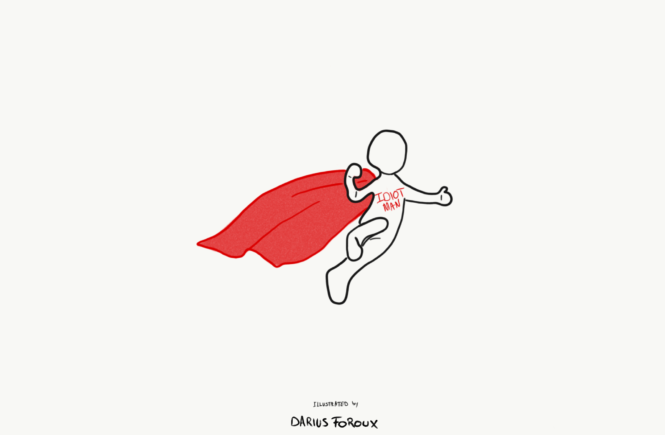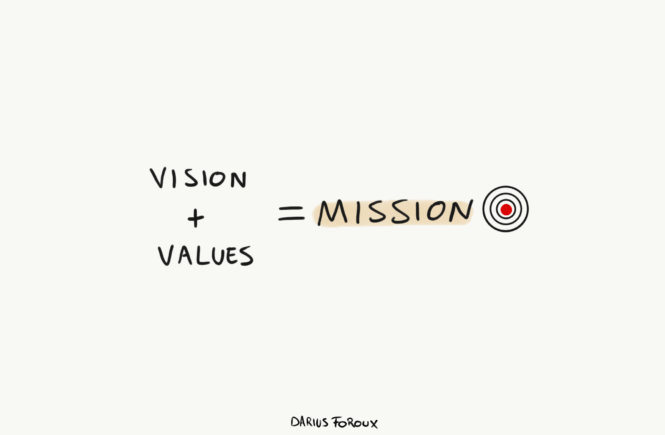When you set out to earn more money, you tend to set absolute financial goals. Somehow this is the default thinking pattern of our brains.
When it comes to money, we prefer working with absolute numbers.
- Instead of saying, “I want to earn more this year than last year,”
- We say, “I want to make $100K this year.”
I call that a ‘fixed goal.’ You don’t only set a fixed number you want to earn, save, or spend, you also get fixated on achieving that financial goal.
And this is not only related to earning certain amounts of money. It’s the same with spending or saving.
A few years back, I set a goal to “spend nothing on clothes for an entire year.” I don’t think I achieved my goal, but I certainly bought way less than before. And this is exactly why you want to avoid fixed goals.
Fixed goals, tunnel vision, and attentional bias
When you set fixed goals, you create a psychological tunnel vision (not to be confused with medical tunnel vision). So you go through life with blinders on.
You get so focused on a particular metric that you forget everything else in life, and sometimes that leads to adverse effects.
In science, the concept that comes close to that is called Attentional Bias.1Source: Science Direct
Attentional bias is the tendency to pay attention to certain stimuli while ignoring others.
For example, if someone is anxious about a potential recession, they may focus more on potential threats (like losing their job) than opportunities (finally changing careers).
This can lead to an overgeneralization of negative outcomes and an underestimation of positive ones.
So here’s what happens. You set fixed goals and get tunnel vision caused by the attentional bias. You keep moving towards your goal even if it’s no longer the right goal.
This is how so many of us get ourselves into life situations that make us miserable. We end up achieving our goals but realize we’re unhappy because we set the wrong goals.
Set ‘flexible goals’ and boost your happiness
Sometime in my teens, I made up the goal to “live somewhere warm.”
When I look back at it now, I honestly don’t know where it comes from. I guess it comes from pop culture. So many movies are set in sunny California. Most music also glorifies sunny places.
You can see this effect on social media too. People love to post photos and videos from warm and exotic places. “I love beaches” is the motto of so many folks.
I also had the fantasy of living somewhere close to a beach. Throughout my adult life, I always kept the possibility of moving to a warm place open.
A few years ago I said, “I want to live in Spain.” Why? Because it’s warm. Okay, great.
Now, I’m glad I didn’t make my goal 100% fixed. Because for the past years, I’ve been making all my goals flexible. So I said:
“I’m going to test what it’s like to live in Spain. If I don’t like it, I’ll come back.”
I didn’t fixate on living there despite anything. Last year I loaded up my car and drove to southern Spain, and stayed there for four months. After two months I knew it was not for me.
I learned I didn’t like to live in Spain at all. I simply enjoyed visiting Spain and coming back home.
Like anything in life, you also get used to the beach, sun, and beautiful environment. Once you’re used to those things and the novelty disappears, your regular life continues.
You wake up, work, exercise, read, and do things for leisure. I can do those things back home in The Netherlands too. But back home, I have much better resources and my family/friends close by.
The weather ain’t the most important thing.
Keep setting goals, good things happen
I’m still very happy I followed through on my goal to live somewhere warm. Here are a few reasons why:
- If I didn’t do it, I would regret it later — I don’t want to be that guy who later says, “Oh man, I wish I made that move when I was young.”
- I learned many new things — When you travel, you always learn new things about yourself and about being efficient with your time and resources. Turns out I’m very patient when it comes to work and learning, but not at all when it comes to daily life.
- I’m more grateful — I grew up in a place with great infrastructure, resources, education, rules, and government efficiency. It was normal to me. When I came to Spain, I saw how inefficient things were, which made me appreciate The Netherlands way more.
- I met someone — I came to Spain single and met an ex-pat girl who I’m dating now. If I didn’t go to Spain we wouldn’t meet.
- I have more material — I always need new input as a writer and life-long learner. Well, I got a lot of input from the entire experience.
There were moments when I thought, “What a waste of time and money!” Because I did try to settle there for a while.
For example, I learned what a hassle it is to register yourself in Spain as an EU citizen to rent a house the official way. It sometimes seems like it’s impossible. That can be frustrating so I thought it was a waste of energy.
But that’s in the moment. You can always find a different perspective on everything. If you set goals and you fail to achieve them, never get down. Always look at what you learned.
Make your goals flexible. Say stuff like:
- “I want to earn more this year.” But don’t be too specific. Simply do your best to earn more, but don’t beat yourself up to achieve it.
- “I’m going to start a side business and whenever I feel like it’s robust, I will do it full-time.” Don’t say things like, “I will be a full-time entrepreneur in 12 months!”
Sure, people love SMART goals, and say, “YOU NEED TO BE SPECIFIC.”
I agree with that 100%. But only for things that are within your control.
You can be specific about how many minutes you will exercise today. But you can’t be specific with everything in life.
It’s up to you to determine when you need flexible goals and when you need SMART goals. If you can do that, you will not only achieve your goals, but you will also be happy.




